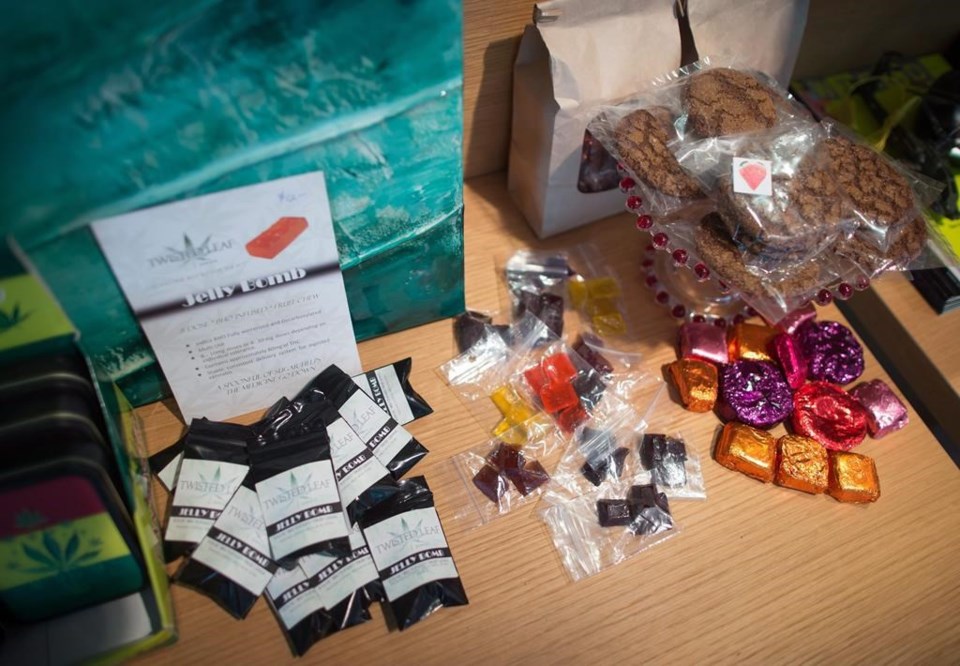TORONTO — Canadian researchers alarmed by a rise in the number of kids hospitalized for accidental cannabis poisonings are calling for restrictions on edibles.
A study published Wednesday in the New England Journal of Medicine found cases among children younger than 10 rose sixfold between January 2015 and September 2021, with a notable spike after edibles such as THC-infused gummies, chocolates and baked goods were approved for sale in 2020.
Lead author Dr. Daniel Myran looked at cases in Ontario, Alberta, British Columbia and Quebec and found hospitalizations jumped more than two and a half times immediately after Canada greenlit recreational use of dried cannabis flower in October 2018.
But he said rates rose again in Ontario, Alberta and British Columbia after those provinces approved edibles in January 2020 — while rates stayed the same in Quebec, which did not permit edible sales.
The Ottawa-based family physician said that suggests the move to legalize edibles has increased the health risks to children, even though federal and provincial rules limit the potency, packaging and access to the products.
Senior author and emergency physician Dr. Yaron Finkelstein, a senior scientist at The Hospital for Sick Children, said he's seen severe cannabis poisonings "many times," including among children who suffered seizures, needed mechanical ventilation or were rendered unconscious.
"Because the effect of edibles takes longer to kick in compared to smoking weed, for example, those children may be consuming larger amounts that are highly concentrated and when they present they're very sick," said Finkelstein.
In the case of one comatose toddler, he said caregivers did not disclose cannabis poisoning as a possible cause until after the child was subjected to a CT scan and spinal tap to rule out other problems.
Researchers found 581 hospitalizations of young children for cannabis poisoning over the seven years included in the study. The average age was 3 1/2 years.
The data did not specify whether or how many of the poisonings were due to edibles versus dried flower, but Myran said he's confident that legal edibles have increased child risks because of the timing of the cases, and the fact that Quebec effectively serves as a control for the study.
In its packaging and labelling guide, Health Canada cites the need to "reduce the attractiveness and appeal of cannabis products, particularly to young persons," placing requirements for child-resistant packaging, limited colours and warning labels. Other rules under the Cannabis Act restrict the amount of THC per package to 10 milligrams — one-tenth of what's allowed in many U.S. states.
If anything, many in the cannabis industry would like to see fewer restrictions, said Omar Khan, a senior vice-president at High Tide Inc., which runs 139 Canna Cabana stores in B.C., Alberta, Saskatchewan, Manitoba and Ontario.
He said tighter THC limits would ultimately undermine regulated products by pushing some consumers to seek illegal edibles with higher concentrations.
"You're just going to drive people into the hands of the illicit market even more. And they're not selling regulated products, they're not checking people's IDs. They're selling 10, 20 units in a package, whereas under Health Canada regulations, we're only allowed to sell one unit at a maximum of 10 milligrams per package," said Khan.
Finkelstein insisted that various government efforts to mitigate potential harm have proven ineffective at addressing unintentional poisonings among kids.
"Despite all those measures, we see this large increase in provinces that allowed it. So we think that the right way would be to prohibit cannabis edibles," said Finkelstein, whose study was funded by the Canadian Centre on Substance Use and Addiction.
Myran, also a preventive medicine specialist at the University of Ottawa and The Ottawa Hospital, said society can still get the social and health benefits of decriminalizing dried cannabis without permitting colourful, candy-like products that attract children.
"We're increasing the risk of health harms with very little public health or health gain," Myran said of legalized edibles.
"Canada's public-health-oriented approach to cannabis was meant to avoid a poorly regulated industry or a commercialized industry. And I think it's a real open question of whether we've hit that balance or not. Data like this, to me, suggests that we don't have strict enough regulations."
Myran acknowledges there are substantial public health, social and equity gains from the decriminalization of cannabis but said a tightened rein on edibles would not lessen them.
"You can get those benefits by decriminalizing cannabis or other substances, or by legalizing it with very tight regulation. You do not need to sell fruity, very visually appealing cannabis products in order to get rid of those criminal justice harms."
This report by The Canadian Press was first published Aug. 24, 2022.
Cassandra Szklarski, The Canadian Press




